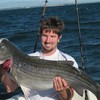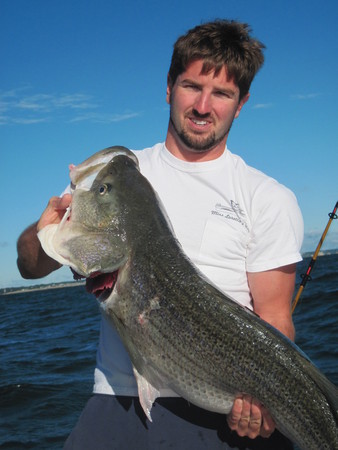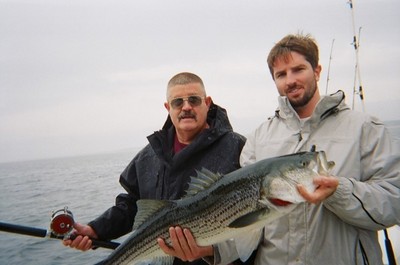This article originally appeared in the sports section of Barnstable-Hyannis Patch.
http://barnstable-hyannis.patch.com/articles/the-bite-is-on-at-race-point
I was around 20 years old when I first took the Miss Loretta to Provincetown. We had just upgraded from a small skiff to a 21 foot walk-a-round. The 21 mile jaunt across Cape Cod Bay to Race Point had always seemed a bit too precarious in the skiff, but with the new boat came a new found confidence. The flat calm seas and beautiful sunrise made the ride that much better.
Forty-five minutes after departing we arrived at a spot known locally as "The Bathhouse." We seemed close to shore; however I was amazed by the reading on the sonar. We had more than 150 feet of water beneath the hull. Seconds later, with my eyes glued to the screen, I watched the bottom rise up out of the abyss. Within a matter of yards we were in just 30 feet of water.
"That is one steep drop off," I said to the crew.
We trolled along the edge of the drop-off north towards Race Point. I kept us in 35 feet of water while simultaneously meandering through the fleet of boats, and the flotilla of lobster pots. The strong current, steep drop-off and extra "company" on the water made this area much more challenging to fish than my usual dwellings within Cape Cod Bay.
Halfway toward Race Point I noticed the fish finder was reading only 8 feet of water, which was strange because I knew we were in at least 35 feet of water.
"Looks like something is wrong with the sonar," I announced to the crew.
Just as the words exited my mouth, the port-side lead core setup bent to the water, and line began peeling from the Penn 113. The starboard-side rod quickly followed suit. We were doubled up!
After a decent battle, we boated both 20 pound class stripers, wormed up the tubes, and began setting them back behind the boat. The sonar was bouncing back and forth between readings of eight and nine feet.
"Fish on!" yelled the crew. "We are doubled up again!"
The next hour produced nonstop action on bass in the 15-25 pound range. I soon realized that nothing was wrong with the sonar. The stack of stripers was so enormous, and so dense, that it confused the sonar into "thinking" the school of bass was actually the bottom of the sea floor.
The stripers were stacked from 8 feet below the water's surface, straight down to the bottom. At the time it was the most bass I had ever seen.
The Provincetown Fishery
Provincetown hosts a dynamic striper fishery, especially during the month of June. Anglers fishing from the beach, boats, and even kayaks catch a lot of bass along the beach front, and the steep drop off that runs from Wood End to Race Point. As described in the above passage, bass will literally stack up like cordwood along the drop off. Even the most accurate sonar systems will confuse the dense schools of bass with the bottom.
Thousands of years of strong currents carved the sand around Provincetown into a sharp drop off. The structure has become a bait magnet which in turn attracts mind boggling numbers of striped bass, bluefish and even whales and tuna to the area.
A pod of Endangered Right whales was spotted this past spring feeding heavily just off Wood End light. Humpback whales and pilot whales can be seen just outside the fleet of fishing boats on many days throughout the season.
Sand eels are the predominant bait, yet herring, mackerel, squid and lobsters are also found in the mix. For predators hunting in the area, Provincetown is as close as it gets to an all-you-can-eat buffet.
Tactics for Fishing the Drop Off
Every method for catching striped bass will work at the Race at one time or another. Some of the most popular methods employed in the area include jigging, trolling, plugging and live eeling.
Over the past few weeks an incredible top water bite has been going off in the area. The waters outside Race Point and around the backside of the Cape have been loaded with bass, bait and birds. Even rookie striped bass anglers have been catching loads of fish well into the 20 and 30 pound class.
This action will probably change once summer settles in. During the height of summer, my crews and I will fish the drop off with live eels and red tubes. If bass are concentrated in one area, pitching live eels can quickly load the boat up with nice sized fish. We will troll tubes when the bass are more spread out along the drop off.
Arguably more important than the choice of lure or bait is the maneuvering strategy employed by the captain. For consistent action, it is vital to keep the boat along the drop off-usually around the 30 foot depth. This can be intrinsically difficult, due to the incredibly steep drop off, strong current, other boats and lobster pots.
The most successful captains are not always the most "talented" fishermen. Instead they are the ones that can adjust to the current, avoid getting hung up on lobster pots, and most importantly, keep their cool while fishing in a crowd.
Bass Behavior on the Edge
If you head to Provincetown during May and June you may be fortunate enough to take part in an incredible top water bite. Sometimes the schools of bass will vacate the drop off, and instead push bait such as herring up along Race Point beach. This makes for incredibly exciting top water fishing in less than 10 feet of water.
This type of behavior will change once July rolls around. When it gets hot on the Cape, bass will usually stay deeper, and congregate along the edge of the drop off.
Bass behavior during July and August can change as quickly as the tide. On some mornings the bite will be hot for a few hours, and then abruptly shut off. The bass will still be there, however lockjaw has set in. Trolling through a school of hundreds of striped bass, and not registering a single bite, happens all the time.
On other days the edge seems completely barren of fish. Cruising up and down the drop off can result in next to nothing marked on the sonar. Then, as if someone has flicked a switch, the bass will descend upon the drop off and stack up in areas where just an hour before there was nothing.
The action can be hot one minute and dead the next. Bass can be extremely fickle creatures when they want to be.
The Race has become a legendary fishing location for striped bass enthusiasts. However it can also be a smart decision to carry a tuna spinning setup when fishing in the area. You just never know what may happen during a fishing trip to the Race.




